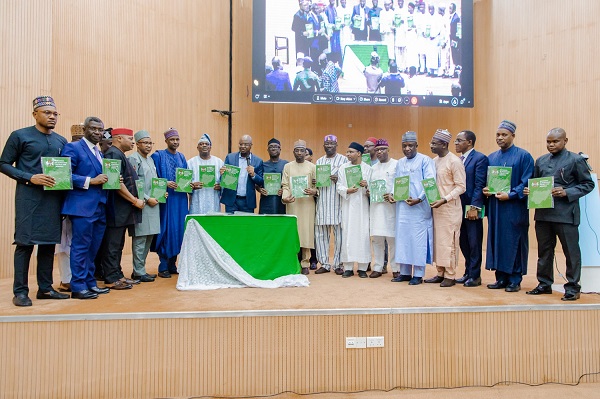
In a move to accelerate the adoption and harness the benefits of emerging technologies, the Federal Government of Nigeria has officially launched a National Policy on Blockchain Technology. Simultaneously, an implementation and steering committee has been inaugurated to oversee the effective implementation of the policy. The objective of the policy is to promote the widespread adoption of blockchain technology in Nigeria and position the country as a prominent player in the global blockchain ecosystem.
The launch of the policy was led by the Minister of Communications and Digital Economy, Prof. Isa Pantami. Pantami recalled that the journey of blockchain technology in Nigeria began on November 28, 2019, when President Muhammadu Buhari unveiled and launched the National Digital Economy Policy & Strategy (NDEPS) for digital Nigeria at the International Conference Centre in Abuja.
The minister highlighted the significance of the seventh pillar, “Digital Society & Emerging Technologies,” in the NDEPS, which has been instrumental in the progress made in adopting blockchain technology.
He stated that Nigeria has developed other policies, such as the Policy on Artificial Intelligence and Robotics, leading to the establishment of the first-ever National Centre for Artificial Intelligence and Robotics (NCAIR) in Africa, located in Abuja. Furthermore, the National Blockchain Policy for Nigeria was developed as part of the efforts to implement the seventh pillar.
Pantami emphasised the importance of blockchain technology to Nigeria’s digital economy drive. He acknowledged that the Fourth Industrial Revolution has provided African nations, including Nigeria, the opportunity to actively participate and not be left behind. He highlighted that disruptive technologies such as blockchain, artificial intelligence, robotics, cloud computing, quantum computing, and more, have reshaped industries worldwide. Nigeria has demonstrated its prowess in technological advancement and established itself as the leading startup hub in Africa.
The minister confirmed that the policy was approved on May 3, 2023, making blockchain technology and all its components and types legal in the country. He emphasized that the policy aims to create an enabling environment for the young population, who are digital natives, to engage in critical thinking, identify complex problems, and develop solutions for adoption and implementation in Nigeria and beyond.
The director-general of the National Information Technology Development Agency (NITDA), Mallam Kashifu Abdullahi welcomed guests to the momentous occasion and stated that the launch represents a significant milestone in the journey toward achieving a digital Nigeria. He highlighted that the policy provides an opportunity to create an enabling environment for investments in talent development, technology access and domestication. This will empower Nigerian citizens to create and capture value from the vast benefits of blockchain technology.
According to Abdullahi, PwC predicts that by 2030, blockchain technology will contribute $1.76 trillion to the global GDP. He emphasized the importance of positioning Nigeria to benefit from this projection, stating that the implementation of the policy could potentially generate up to $4 billion for the country.
The launch event also included the inauguration of the National Blockchain Policy Implementation/Steering Committee and the graduation of 32,022 beneficiaries who received training in blockchain technology. The minister, while inaugurating the committee and presenting certificates to the beneficiaries, emphasised the government’s commitment to building on the initiative already set in motion. The committee, consisting of 29 members representing critical sectors of the economy, will play a vital role in ensuring the successful implementation of the policy.
The graduates shared their success stories and expressed gratitude to the Federal Government, the Ministry of Communications and Digital Economy, NITDA and the facilitators for providing them with the opportunity to receive training in blockchain technology. They pledged to make the best use of the knowledge gained during the training and contribute to Nigeria’s advancement in the field of blockchain technology.


